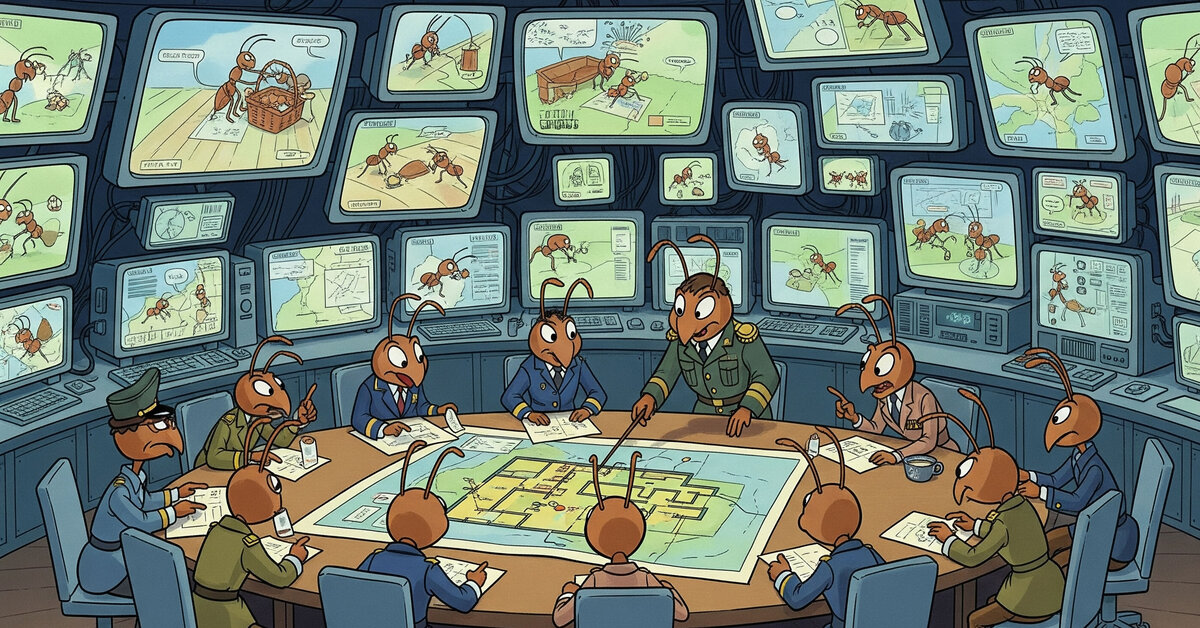The Ants Who Knew Too Much
It began, as all great intelligence leaks do, with a crumb.
Not just any crumb, but the flaky remnant of a croissant, dropped absentmindedly by an intern outside the Pentagon. Within thirty seconds, a scouting ant discovered it, brushed its antennae against the prize, and began its pheromone trail back to the nest. Within three minutes, a column of ants was moving in perfect order, their chemical breadcrumbs guiding thousands toward the pastry payload.
If you think this is just about breakfast, you underestimate the operational efficiency of Formicidae.
For years, humans have obsessed over spy satellites, encrypted messaging apps, and the occasional trench coat with a false moustache. But ants? Ants have been running silent, flawless espionage campaigns for over 100 million years.
They need no Wi-Fi.
They need no passwords.
They need only legs, pheromones, and a disregard for private property.
Entomologists call it “swarm intelligence.” Ants call it “Monday.” Each worker may appear brainless, but together they form a decision-making web so efficient that if ants were people, they’d have already cracked the Enigma machine before the war even started!
While the RAW struggles with secure comms, ants run a peer-to-peer network using scent trails so robust that no adversary has ever hacked it, unless you count the occasional cockroach.
Picture this: a high-security data centre. Triple-locked doors. Biometric scanners. Guards trained to notice the faintest anomaly.
And then, one day, a janitor notices a line of ants walking in under the door.
They do not beep at metal detectors. They do not show up on infrared. They are small. So small, in fact, that a hundred of them can enter unnoticed, each carrying a fleck of shredded paper, a breadcrumb of classified intel, or, more likely, a literal breadcrumb.
Before long, they’ve mapped the ventilation system, tagged the coffee machine as a priority resource, and established forward-operating bases under the snack vending machine. The ants are now everywhere. You can’t expel them without fumigating the entire building and try getting that past your boss.
Human spies rely on disguises. Ants rely on being ignored. And what could be more invisible than the ant you crushed absentmindedly while checking your email?
To better understand the threat, I arranged an exclusive interview with General Formica rufa, a decorated leader of the Woodland Ant Division. We met in a patch of grass behind a strip mall, where the General insisted, we sit at “eye level.” This meant I had to lie flat on my stomach while dozens of his aides climbed onto my notebook.
Me: General, what motivates ants to engage in espionage against humans?
General Formica: Motivates? We have no motives. We have coordination. You drop sugar; we arrive. You build walls; we dig under. You encrypt secrets; we chew the cables. For us, infiltration is not a strategy, it is a reflex.
Me: But surely, if ants had human-like motives, wouldn’t you-
General Formica: -Rule the world? Of course. Already, we command armies that dwarf your human battalions. Ten quadrillion soldiers, ready to mobilize at the twitch of an antenna. Your “spies” need clearance badges. Ours need only six legs and a hole in the drywall.
Me: So, what’s next for ant intelligence gathering?
General Formica: Expansion. We are targeting your kitchens, your pantries, your picnics. Every fallen chip is a data node. Every drop of soda, a coded signal. We read your trash as you read newspapers. You call it garbage. We call it archives.
Me: That sounds… advanced.
General Formica: Unless, of course, you develop countermeasures. Which you will fail to implement, because your species would rather invent drones than sweep behind the fridge.
Humans love gadgets. Fingerprint scanners, facial recognition, artificial intelligence. But ants bypass every one of these systems with sheer audacity.
- Motion sensors? Ants are too small to trigger them.
- Firewalls? Ants chew through the literal wall.
- Security cameras? Ants don’t show up, unless the operator zooms way in, and by then it’s too late.
- Spy satellites? Ants operate entirely indoors, thank you.
Meanwhile, ants run algorithms so sophisticated that NASA uses them as models for space exploration. Swarm robotics is basically ant cosplay for machines. But while humans are still testing prototypes, ants have been deploying the system flawlessly since the Cretaceous period.
What, then, is humanity to do in the face of this six-legged menace? You can’t out-code them. You can’t out-sneak them. But you can out clean them.
Counterintelligence Tips:
- Deploy the Broom Protocol. Sweep regularly, especially in corners where ants like to set up “embassies.”
- Sugar Trap Doctrine. Ants are distractible. A strategically placed sugar cube can buy you critical time while you move the real intel elsewhere.
- Operation Picnic Etiquette. Stop dropping snacks in public parks. Every ant colony within a mile radius treats your sandwich as a rallying cry.
- Seal the Vents. Ants are masters of duct infiltration. Caulk is your new cybersecurity software.
- Psychological Warfare. Remember: an ant scout who doesn’t return home cannot complete the pheromone trail. This is the ant version of cutting off internet access.
Perhaps the greatest irony is that while we humans imagine ourselves as masters of intelligence, surveillance, and reconnaissance, ants have been running their own covert operations right under our noses, literally under, in the floorboards.
You worry about foreign operatives hacking your email. Meanwhile, ten thousand ants already know your Wi-Fi password, because you typed it while eating toast.
So, the next time you see a single ant crawling across your desk, don’t dismiss it. That’s not just a bug. That’s a scout. That’s a spy. And somewhere, deep in the grass, General Formica is watching, waiting, and plotting his next move.
With patience, precision, and an endless appetite for crumbs… the ants may already have won.
By Jaya Avaaaneesh Jayamanikandan
Visit our Facebook Page : Little Authors | Facebook

